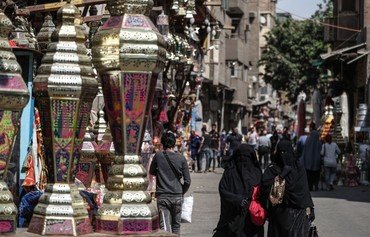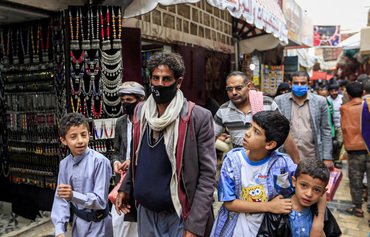At the start of Ramadan, Yemen's markets and mosques were filled with people despite the underlying threat of a novel coronavirus (COVID-19) outbreak.
But after the government confirmed five new infections in Aden on April 29th and the Iran-backed Houthis (Ansarallah) reported the first coronavirus death in Sanaa on May 5th, the atmosphere of the holy month has changed.
The first six days of Ramadan in Yemen had a starkly different atmosphere than in other Arab and Islamic countries, as mosques were crowded with worshipers, calls to prayer rang out from minarets and markets were abuzz with shoppers.
While other countries imposed strict lockdown measures to prevent the spread of the virus, Yemen's Ministry of Endowments and Guidance on the eve of Ramadan lifted the ban on Friday prayers and congregation prayers in mosques.
![A member of the Houthis, wearing a protective mask and gloves, disperses a crowd in Sanaa on May 6th, as part of an effort to curb the spread of coronavirus. [Mohammed Huwais/AFP]](/cnmi_am/images/2020/05/13/24037-Houthi-Sanaa-covid-600_384.jpg)
A member of the Houthis, wearing a protective mask and gloves, disperses a crowd in Sanaa on May 6th, as part of an effort to curb the spread of coronavirus. [Mohammed Huwais/AFP]
A partial curfew in Hadramaut province also was lifted.
But six days later, on April 29th, Yemen's supreme national emergency committee for COVID-19 confirmed five new infections in Aden.
The committee on Tuesday (May 12th) announced nine new confirmed cases in government-controlled areas, including for the first time in Abyan, al-Mahra and Shabwa provinces, raising the total number of cases to 65, including 10 deaths.
After confirming the Aden infections, which have since risen to 39, it announced a three-day lockdown, closure of mosques and suspension of Friday and congregational prayers in government-controlled provinces.
At that time, there were still no reported cases in the Houthi-controlled northern provinces, where residents continued to visit mosques and markets were "crowded with shoppers", political analyst Faisal Ahmed told Al-Mashareq.
Two infections have since been confirmed, though the actual numbers in Houthi-controlled areas are thought to be much higher than reported.
Joyful atmosphere changed
"The legitimate government-controlled southern provinces enjoyed a normal first six days of Ramadan before the atmosphere quickly changed following the confirmation of the five cases of infection in Aden," Ahmed said.
People in the southern provinces were jubilant when the curfew was lifted and mosques reopened on the eve of Ramadan, he said. "But this did not last, as the curfew was reinstated and mosques were closed once again."
Some families have left Aden for fear of contracting the virus, Ahmed said.
Since announcing the first death in Sanaa, "the Houthis have banned the taraweeh prayers in most mosques in the areas under their control", he said.
"But they pressure people to attend the Ramadan evening meetings, which feature the group leaders' lessons", he added, noting that these "promote their sectarian ideas and project that serves Iran".
Deputy Minister of Human Rights Nabil Abdul Hafeez accused the Houthis of "using religious occasions to promote their sectarian project and mobilise fighters to the frontlines".
The militia has continued its incitement even after the Arab coalition announced it had extended a ceasefire by one month on the first day of Ramadan, he said.
Compounding the humanitarian crisis
Aid organisations have warned that a COVID-19 outbreak could have dire consequences in Yemen, where the healthcare system has been blighted by years of conflict.
"There is now a very real probability that the virus has been circulating undetected and unmitigated within communities" in Yemen, the UN Office for the Co-ordination of Humanitarian Affairs (OCHA) warned on April 28th.
"Since the first confirmed COVID case, we have warned that the virus is now in Yemen and may quickly spread," said Lise Grande, humanitarian co-ordinator for Yemen.
"The factors are all here," she said. "Low levels of general immunity, high levels of acute vulnerability and a fragile, overwhelmed health system."
It is important that all Yemenis abide by the supreme committee's instructions, Deputy Minister of Health and Population Ali al-Walidi told Al-Mashareq.
This includes protecting their own health, co-operating with surveillance teams and reporting suspected cases to prevent the contagion from spreading, he said.
"Epidemiological surveillance teams are tracing contacts of confirmed patients in Aden to conduct laboratory tests on them to ensure their safety," he said.
The ministry also signed an agreement with Doctors Without Borders (MSF) to run Aden's Al-Amal Hospital as an isolation centre for COVID-19 patients.

![A Yemeni worker disinfects inside a mosque in the northern Hajjah province on May 7th, as part of measures to curb the spread of coronavirus. [Essa Ahmed/AFP]](/cnmi_am/images/2020/05/13/24036-Yemen-mosque-disinfection-600_384.jpg)







The dream
Reply1 Comment(s)